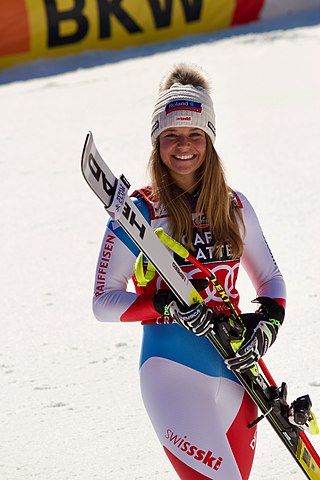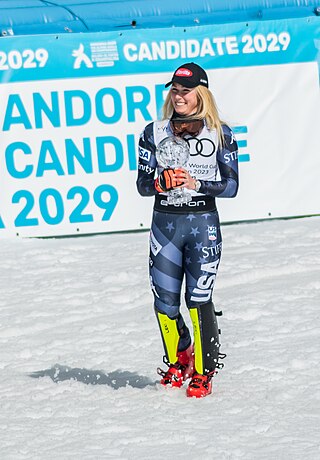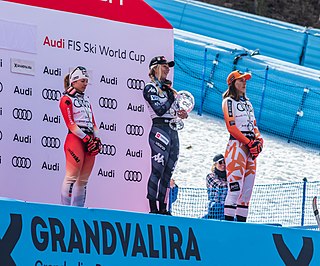
The 47th World Cup season began on 27 October 2012, in Sölden, Austria, and concluded on 17 March 2013, at the World Cup finals in Lenzerheide, Switzerland. The overall titles were won by Marcel Hirscher of Austria and Tina Maze of Slovenia.

The International Ski Federation (FIS) Alpine Ski World Cup was the premier circuit for alpine skiing competition. The inaugural season launched in January 1967, and the 2018–19 season marks the 53rd consecutive year for the FIS World Cup.

The International Ski Federation (FIS) Alpine Ski World Cup, the premier circuit for alpine skiing competition, began in January 1967, and the 2019–20 season marked the 54th consecutive year for the FIS World Cup. As it had every year since 2006, the season began in Sölden, Austria in October. The season was supposed to end with the World Cup finals in March, which were to be held in Cortina d'Ampezzo, Italy for the first time since they began in 1993, but the finals were cancelled due to the COVID-19 outbreak in Italy.

The women's super-G in the 2020 FIS Alpine Skiing World Cup involved 6 events, which produced six different winners from five different countries.

The women's giant slalom in the 2020 FIS Alpine Skiing World Cup involved 6 events. The season had been scheduled for nine events, but all of the last three giant slaloms were canceled.

The women's overall in the 2020 FIS Alpine Skiing World Cup involved 30 events in 6 disciplines: downhill (DH), Super-G (SG), giant slalom (GS), slalom (SL), Alpine combined (AC), and parallel (PAR). This was the first year that parallel was treated as a separate discipline; prior to the 2019–20 season, it had been a sub-element of the slalom discipline. The season had originally been scheduled to have 41 races, but 11 races that had originally been scheduled were canceled during the season, mostly due to the COVID-19 pandemic, as discussed below.

The women's giant slalom World Cup 2021/2022 consisted of 9 events including the final. Overall World Cup leader Mikaela Shiffrin from the United States, who started out in the early lead in this discipline, contracted COVID-19 at the end of 2021 and missed the post-Christmas giant slalom, then Shiffrin lost the lead in this discipline to Sara Hector of Sweden in the first race in 2022.

The International Ski Federation (FIS) Alpine Ski World Cup is the premier circuit for alpine skiing competition. The inaugural season launched in January 1967, and the 2022–23 season marks the 57th consecutive year for the FIS World Cup.

The women's super-G in the 2023 FIS Alpine Skiing World Cup included eight events, including the final. The original schedule called for nine events, but a scheduled downhill at St. Anton on 14 January was converted to a super-G due to the inability to hold pre-race practice runs on either of the two days prior to the event. A later super-G at Cortina was converted into a downhill to restore the original schedule balance, but then a downhill at Crans Montana on 25 February had to be delayed a day due to fog and dangerous course conditions, and the super-G previously scheduled for that day was cancelled and not rescheduled.

The women's giant slalom in the 2023 FIS Alpine Skiing World Cup included ten events, including the final. The season was scheduled to open in Sölden, Austria on 22 October 2022, but the race was cancelled due to bad weather and rescheduled to Semmering, Austria on 27 December.

The women's slalom in the 2023 FIS Alpine Skiing World Cup consisted of eleven events, including the final. The original schedule also called for eleven events, but a night slalom at Zagreb on 5 January was cancelled due to high winds and warm weather and not immediately rescheduled. However, a week later, the race was rescheduled as a second slalom at Špindlerův Mlýn on 28 January, accompanied by a shift of the giant slalom scheduled there that day to Kronplatz on 25 January.

The women's overall competition in the 2023 FIS Alpine Skiing World Cup consisted of 38 events in four disciplines: downhill (DH), super-G (SG), giant slalom (GS), and slalom (SL). The fifth and sixth disciplines, parallel (PAR). and Alpine combined (AC), had all events in the 2022–23 season cancelled, either due to the schedule disruption cased by the COVID-19 pandemic (AC) or due to bad weather (PAR). The original schedule called for 42 races, but in addition to the parallel, two downhills and a super-G were cancelled during the season.

The men's super-G in the 2023 Alpine Skiing World Cup consisted of eight events, including the final. The season was originally planned with eight races, but two were cancelled early in the season and were not planned to be rescheduled. However, when two races planned at Garmisch-Partenkirchen on 28-29 January 2023 were cancelled due to a lack of snow, the two previously-cancelled Super-G races were rescheduled on those dates at Cortina d'Ampezzo, restoring the original Super-G schedule plan.

The women's overall in the 2019 FIS Alpine Skiing World Cup involved 35 events in 5 disciplines: downhill (DH), Super-G (SG), giant slalom (GS), slalom (SL) [which included parallel slaloms and city events], and Alpine combined (AC). After this season, city events were discontinued, and a new parallel discipline was created for parallel slaloms and parallel giant slaloms.

The women's giant slalom in the 2019 FIS Alpine Skiing World Cup involved 8 events.

The women's slalom in the 2019 FIS Alpine Skiing World Cup involved 12 events, including three parallel slaloms. At the end of the season, a new discipline was created for parallel races.

The women's slalom in the 2017 FIS Alpine Skiing World Cup involved 10 events, including one parallel slalom and the season finale in Aspen, Colorado (USA).

The women's super-G competition in the 2016 FIS Alpine Skiing World Cup involved sight events, including the season final in St. Moritz, Switzerland.

The women's slalom competition in the 2016 FIS Alpine Skiing World Cup involved 11 events, including one parallel slalom and the season finale in St. Moritz, Switzerland.

The women's super-G in the 2023 FIS Alpine Skiing World Cup is scheduled to include ten events, including the final. Currently, as discussed below, one super-G on 10 December in St. Moritz had been canceled, but it was rescheduled as a second super-G in Zauchensee on 12 January. As discussed in the season summary below, another cancellations took place at the start of February, reducing the season to ten races.
















